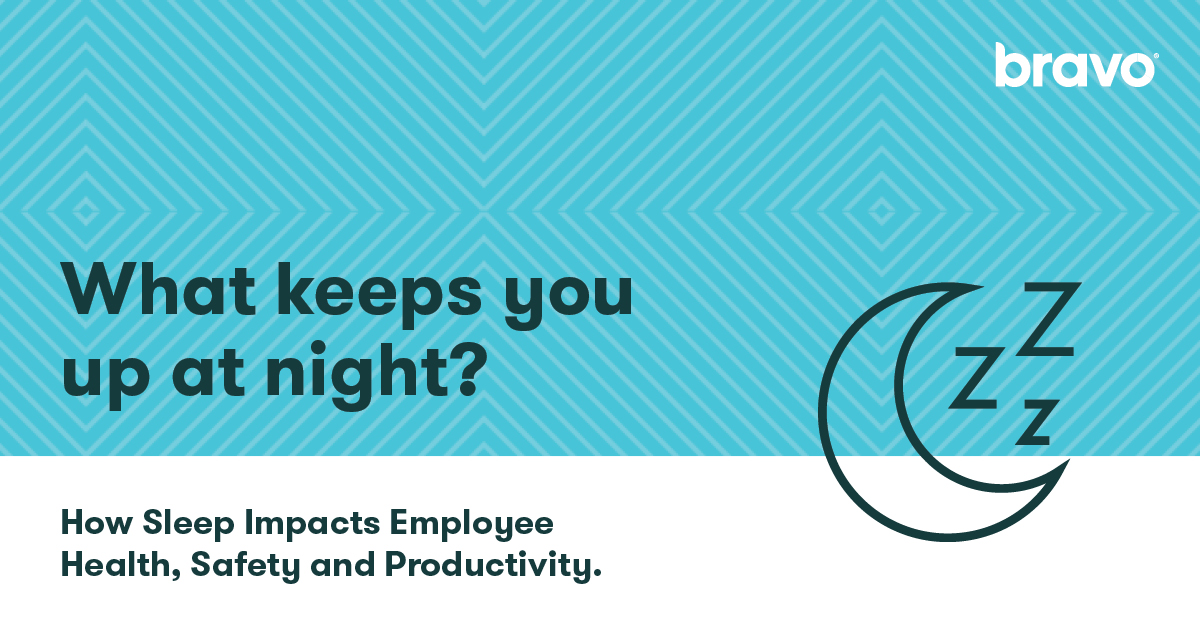Insomnia is a massive issue in the US, and the consequences range in severity and scope across the spectrum of physical and mental health.
Events in the last 12 months including the pandemic and civil unrest have likely worsened this situation, as they've caused unprecedented levels of stress, which can induce anxiety that negatively affects sleep.
To help your workforce get the recommended seven to nine hours of sleep per night, we’ve consolidated the research on why sleep is important for employees and your business, and provided seven recommendations for HR, benefits and workplace wellness teams to help employees get better sleep.
In this article, we’ll dive into:
What is insomnia?
Insomnia is a sleep disorder characterized by difficulties sleeping at night. People with insomnia have one or more of the following symptoms:
- Trouble falling asleep
- Waking up during the night and trouble going back to sleep
- Waking up too early in the morning
- Having unrefreshing sleep
- Daytime problems due to not sleeping well, like fatigue, sleepiness, mood or concentration issues or accidents at work or while driving.
Insomnia symptoms occur in approximately 33% to 50% of the adult population, while chronic insomnia (when sleep difficulties occur at least three times/week for three months or longer) affects an estimated 10% to 15% of adults.
What are common causes of insomnia and sleep issues?
The causes of sleep deprivation can be physiological, environmental, psychological and behavioral. Several research studies have found that sleep deprivation is frequently a product of multiple simultaneous factors.
Here are a few common causes of insomnia symptoms according to Cleveland Clinic:
- Life stressors, including your job, relationships and financial security
- Unhealthy lifestyle habits
- Mental health disorders like anxiety and depression
- Chronic diseases like cancer
- Chronic pain
- Gastrointestinal disorders
- Hormone fluctuations
- Medications
- Alcohol or drug use
- Neurological disorders
- Other sleep disorders
What are the impacts of poor sleep on the economy and the workplace?
While not everyone who has trouble falling or staying asleep has insomnia, we know that at any given time, approximately a third of US adults are suffering from lack of sleep. The pandemic has likely worsened these numbers, as unmanaged stress can lead to anxiety that negatively affects sleep.
The consequences of sleep deprivation in the workplace can be dangerous and costly:
How does employees’ sleep impact their safety, health and productivity?
Sometimes, sleep issues are caused by factors outside of life or work stressors. In fact, certain health risks are associated with, can cause, or be exacerbated by insufficient sleep. Check out these sleep statistics and how sleep and health are intertwined:
- Cardiovascular risks – American Heart Association researchers found that a lack of sleep is associated with increased calcium buildup in the heart’s arteries, which can cause plaques that put people at risk for a heart attack. Other cardiovascular risks include high blood pressure, high blood sugar, inflammation and obesity.
- Mental Health - Chronic lack of sleep can raise the chance of having a mood disorder. One large study showed that when you have insomnia, you are five times more likely to develop depression, and your odds of anxiety or panic disorders are even greater. Depression is a significant cause of disability, absenteeism, presenteeism and productivity loss among working-age adults, costing employers $44 billion each year in lost productivity.
- Type 2 Diabetes – Many people with type 2 diabetes experience trouble sleeping, and less restorative slow-wave sleep has been linked to high blood sugar levels in people with diabetes and prediabetes. Sleep deprivation also raises the risk of developing insulin resistance in the first place.
- Obesity - When you’re well-rested, you’re less hungry. Sleep deprivation messes with the hormones in your brain—leptin and ghrelin—that control appetite, and many overcompensate for lack of sleep with sugary snacks or energy drinks to get through the day. A poor diet is one of the leading causes of obesity.
- Decreased immune response - To help you ward off illnesses, your immune system identifies harmful bacteria and viruses in your body and removes them. Ongoing lack of sleep changes the way your immune system works: Your body may not attack harmful actors as quickly or effectively, and you could get sick more often.
- Injury and accidents - Overly sleepy employees are 70% more likely to be involved in workplace accidents, which can result in injury and even put others at risk, particularly in the transportation, manufacturing and healthcare industries.
The bottom line is that consistent, restful sleep helps the body and mind repair, regenerate and recover. Research has shown that better sleep quality can help the body fight off infection and illness, keeping employees healthier and happier.
How To Help Employees Get Better Sleep: 7 Tips for HR, Health and Wellness Managers
Finding effective and creative methods to highlight the importance of sleep for personal health and work productivity is essential. Here’s what we recommend:
1. Know and practice healthy sleep habits yourself.
You're better equipped to help others achieve their best when you first take care of yourself. That includes getting a good night's rest.
Also known as sleep hygiene, these healthy habits can do wonders for uninterrupted, good-quality sleep:
- Set a schedule that allows you seven to nine hours of sleep every day.
- Follow your sleep schedule by going to sleep and waking up around the same time every day, weekends and vacations included!
- Make sure your bedroom is a comforting and stress-free place. Follow these tips for creating a sleep sanctuary.
- Follow best practices before you sleep, like avoiding alcohol and caffeine, and writing down tomorrow's to-do's so you don't think about them before you fall asleep.
- Follow best practices after you wake up, like not pressing the snooze button and letting natural light into your bedroom to increase your energy.
For more, download our "14 Tips for Better Sleep."
2. Learn and recognize the symptoms of sleep deprivation.
It's important for managers and coworkers to detect and address signs of fatigue in their colleagues because individuals may not recognize it themselves, and many individuals overlook their performance deficits caused by sleep deprivation. They often misjudge their state of mind and abilities, believing that they can handle significant decisions and tasks when they cannot, leading to costly and dangerous errors or accidents.
Create a training program to help employees and managers identify and address fatigue symptoms to reduce workplace accidents and increase productivity and well-being. Some of the most common signs of fatigue are:
- Slowed thinking
- Reduced attention span
- Worsened memory
- Poor or risky decision making
- Lack of energy
- Mood changes including feelings of stress, anxiety or irritability
3. Provide coaching to help employees build healthy sleep habits.
Sleep issues can be perpetuated by certain thought patterns and behaviors every day without realizing their detriment.
Like many other areas of health and wellness, it's important to address the root cause of sleep issues and get the proper support in order to make long-lasting, positive changes.
Personal health coaching is a great way to help individuals identify their personal causes of poor sleep and create a plan to improve it that works within their lifestyle and personal responsibilities.
4. Educate employees about the benefits of healthy sleep, and how to achieve it.
Post tips and worksheets about how to get better sleep (feel free to use the ones linked above) on your company intranet, or in your next email newsletter.
Another idea is to host a company lunch and learn. Here's one we hosted a while back to teach our own employees about:
- Why sleep is important
- Why many people can't sleep
- What foods do and don't help with sleep
- Tips for a better night's sleep
- Sleep aids that aren't medication
Feel free to use it as a reference or share it directly with employees:
5. Encourage daily exercise.
A recent study in the Journal of Clinical Psychology found that people struggling with sleep deprivation who walk for 45 to 60 minutes in the morning experienced a more restful night of sleep.
Not only does exercise tire you out, but it can also relieve stress and anxiety—which are sleep’s worst enemies.
Consider starting up a step or activity challenge as part of your employee wellness program to help employees get active.
6. Consider workplace napping allowances.
Over recent years, workplace napping has actually grown in popularity. Industries that provide around-the-clock services, with long and overnight shifts like healthcare or manufacturing, a dedicated space for brief naps and breaks can promote health and reduce accidents and mistakes.
If you see that your employees are sleep deprived, encourage them to take a nap. Whether it’s breaking away for some rest at a scheduled break or mealtime, napping can be a great way to boost your employees’ energy at work and help them know that their sleep and well-being are a priority to you.
7. Set the standard for prioritizing rest and recovery at the management level.
In some competitive work environments or seasonal periods of busyness, it may seem fair to trade off sleep for the additional work you think you're accomplishing.
But this argument isn’t based on sound logic. Going to bed later to squeeze out a little more work leaves you more tired and less engaged the next day and can become a vicious cycle.
Make sure management at all levels of the organization prioritize their own rest and set the right example for their employees. Here are some examples of what this could look like:
- Using and encouraging the use of paid time off, declining meetings and turning off notifications while during their off days.
- Discouraging work outside of regular working hours or off days.
- Only responding to emails and messages during scheduled hours.
We’re here to help your workforce improve their health and well-being, even during COVID-19.
At Bravo, we’re aware of the challenges this pandemic has created for your workforce, and our focus is to help employees maintain both their physical and mental health.
Being able to support your workforce during times like these is essential to establishing or strengthening a culture of wellness in your organization and enabling employees to achieve their personal and professional best.
Download these employee well-being resources that will help employees manage their stress and create a healthy routine that supports quality sleep.
Download Employee Well-Being Resources
Learn more about Cleveland Clinic Coaching, a suite of 15 programs that help participants improve their physical and mental health. Help your employees get to the root cause of their sleep issues with lifestyle and behavioral improvements with one-on-one support.
Learn More About Cleveland Clinic Personal Health Coaching


